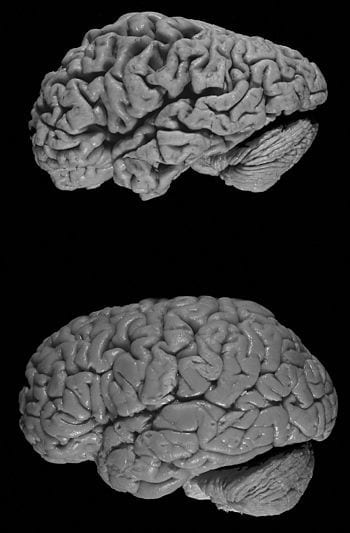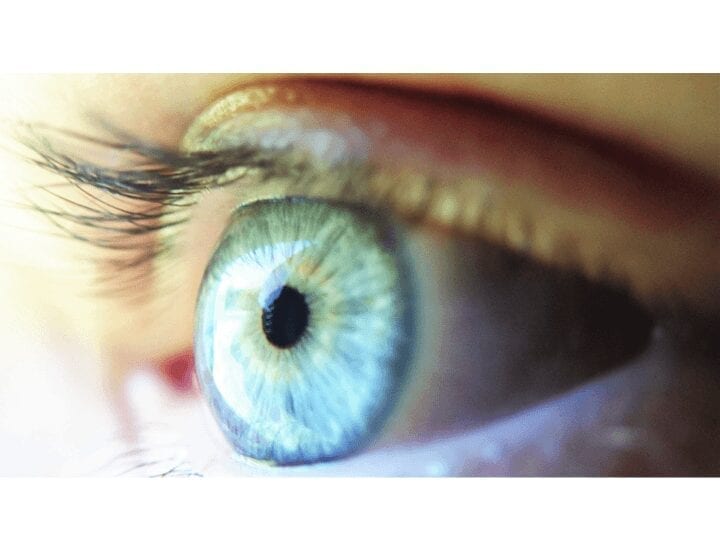
York University researchers say a simple test that combines thinking and movement can help to detect heightened risk for developing Alzheimer’s disease in a person, even before there are any telltale behavioural signs of dementia.
Faculty of Health Professor Lauren Sergio and PhD candidate Kara Hawkins who led the study asked the participants to complete four increasingly demanding visual-spatial and cognitive-motor tasks, on dual screen laptop computers. The test aimed at detecting the tendency for Alzheimer’s in those who were having cognitive difficulty even though they were not showing outward signs of the disease.
“We included a task which involved moving a computer mouse in the opposite direction of a visual target on the screen, requiring the person’s brain to think before and during their hand movements,” says Sergio in the School of Kinesiology & Health Science. “This is where we found the most pronounced difference between those with mild cognitive impairment (MCI) and family history group and the two control groups.”
Hawkins adds, “We know that really well-learned, stereotyped motor behaviours are preserved until very late in Alzheimer’s disease.” These include routine movements, such as walking. The disruption in communication will be evident when movements require the person to think about what it is they are trying to do.
For the test, the participants were divided into three groups – those diagnosed with MCI or had a family history of Alzheimer’s disease, and two control groups, young adults and older adults, without a family history of the disease.
The Latest on: Alzheimers detection
[google_news title=”” keyword=”Alzheimers detection” num_posts=”10″ blurb_length=”0″ show_thumb=”left”]
via Google News
The Latest on: Alzheimers detection
- From Theory to Therapy: MIT’s Computational Breakthrough in Protein Optimizationon April 29, 2024 at 3:40 am
MIT researchers plan to search for proteins that could be used to measure electrical activity in the brain. To engineer proteins with useful functions, researchers usually begin with a natural protein ...
- New study reveals potential cellular mechanism behind cognitive decline in Alzheimer'son April 28, 2024 at 7:04 pm
Researchers have developed a robust method for identifying rare brain neurons that re-enter the cell cycle, offering insights into their role in cognitive disorders such as Alzheimer's disease.
- Alzheimer’s, Cancer To Diabetes: Important Tests To Get Depending On Your Family Historyon April 27, 2024 at 3:49 am
A family history of chronic diseases can put healthy individuals at risk Therefore getting regular tests is crucial for early diagnosis ...
- Dr. Paul Aisen recognized as 2024 Alzheimer’s Association Research Championon April 25, 2024 at 7:19 pm
Dr. Paul Aisen was honored by the Alzheimer’s Association San Diego/Imperial Chapter as the 2024 Research Champion at the inaugural Brilliance Luncheon held April 19 at the Catamaran Resort Hotel in ...
- Large-scale study identifies new approach to early Alzheimer's detectionon April 22, 2024 at 11:48 pm
Digital memory test and a blood sample - this combination will be tested for its potential to identify early Alzheimer's disease in a new research study. Over a hundred healthcare centers are part of ...
- Groundbreaking Study Links Tiny Brain Bubbles to Alzheimer’s Progressionon April 20, 2024 at 3:55 pm
Researchers at Sanford Burnham Prebys have shown that vesicles transporting between brain cells contain more complete instructions for altering cellular function than previously thought. In a study ...
- Omaha experts weigh in on findings from new Alzheimer’s studyon April 17, 2024 at 11:23 pm
The Alzheimer’s Association is calling for increased prevention and earlier detection when it comes to communities of color.
- Letters for April 18: Lawmakers must continue prioritizing Alzheimer’s research, supporton April 17, 2024 at 3:01 pm
Letter writers urge Rep. Jen Kiggans to continue supporting Alzheimer’s initiatives, urge localities to find humane ways of dealing with homeless people, and argue AR-15s are not assault ...
- A window into Alzheimer's and early detection - how regular eye exams could helpon April 17, 2024 at 9:21 am
Poets have written it for years, that our eyes are the windows to our souls but it turns out, they are a lot more than that. A new study indicated that a look in your eyes could be an early detector ...
- This Eating Habit Is One of the Earliest Signs of Alzheimer's, According to a Neurologiston April 17, 2024 at 3:26 am
One of the earliest signs of Alzheimer’s has more to do with one’s eating habits than it does being forgetful. Here, a neurologist explains what it is and other ways that Alzheimer’s disease can ...
via Bing News










